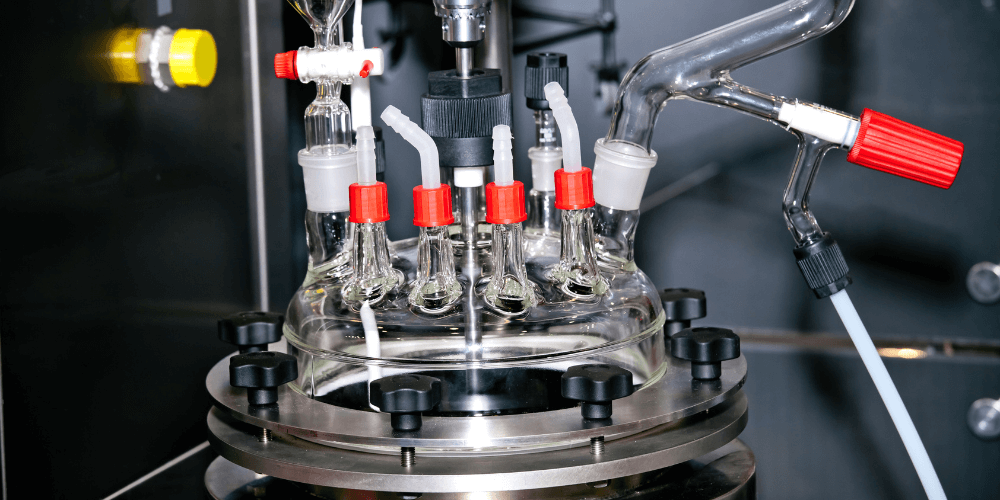Chemical synthesis is an intricate and careful procedure that necessitates vigilant observation and regulation of reaction conditions. Each aspect is vital, from the management of temperature and pressure to the precise compliance with reaction times.
This is where glass jacketed reactors come into play as an indispensable tool in chemical synthesis. Their unique feature of unmatched transparency and control over reaction conditions has made them highly valuable.
Several parameters, including temperature, pressure, and reaction time, must be upheld to attain the desired outcomes. A glass jacketed reactor is an indispensable apparatus in chemical synthesis. In this composition, we shall deliberate upon the benefits of implementing glass jacketed reactors in chemical synthesis.
In the forthcoming article, we will extensively explore the diverse advantages of glass jacketed reactors in chemical synthesis, highlighting their contribution to achieving dependable and improved outcomes.
Reactors are Resistant to Corrosion Thermal Shock
A reaction vessel, known as a glass jacketed reactor, is crafted from borosilicate glass. This type of glass is highly resistant to chemical corrosion and thermal shock. The reactor is enveloped by a glass jacket, which generates a space between the internal vessel and the outer jacket. A cooling or heating fluid occupies the space, preserving the reaction's temperature. Moreover, the jacket operates as a protective layer, shielding the reactor against any external harm.
Better Temperature Control
Glass jacketed reactors provide superior thermoregulation, surpassing other types of reaction vessels. The external jacket that envelopes the inner chamber permits the efficient modulation of the reaction's temperature. Furthermore, the fluid flowing through the jacket stabilizes the temperature homogeneously throughout the reaction, enhancing the reliability of the results.
Enhanced Safety
In terms of security, glass jacketed reactors prove to be less perilous compared to other types of reaction vessels. The borosilicate glass' chemical resistance reduces the probability of its failure during the reaction, preventing chemical accidents and spills, thereby making it the safest choice for chemical synthesis.
Better Reaction Visibility
The clear glass construction of jacketed reactors provides improved visibility of the ongoing reaction, rendering it easier to monitor the reaction's progress, identify possible glitches, and make necessary changes to the reaction conditions.
Flexibility in Reactant Addition
Glass jacketed reactors also provide greater flexibility in adding and eliminating reactants during the reaction, thanks to the vessel's top opening. This helps modify the reaction conditions as required, enhancing the reaction's outcomes.
Easy to Clean and Maintain
Additionally, glass jacketed reactors are convenient to clean and maintain. The glass material's chemical resistance permits easy cleansing with solvents or detergents, decreasing the need for frequent replacement of reaction vessels and making it a more economical option for chemical synthesis.
Applications of Glass Jacketed Reactors
Glass jacketed reactors have several applications in the chemical, pharmaceutical, and biotechnology sectors, among others. They are employed in a number of chemical synthesis procedures, including polymerization, distillation, and organic synthesis, among others. Glass jacketed reactors are utilized in the pharmaceutical sector for the manufacturing of active pharmaceutical ingredients (APIs), medication development, and quality control. They are employed in the biotechnology sector to create biopharmaceuticals such monoclonal antibodies and vaccinations.
Bonus Read
Glass jacketed reactors provide superior thermal control, improved safety, superior reaction observability, reactant flexibility, and facile upkeep compared to other reaction vessels. These benefits have made glass jacketed reactors a clear choice in chemical synthesis and a prevalent industry standard.
With the aid of a jacket, these reactors facilitate optimal temperature regulation, which is crucial for the synthesis of various chemical compounds. Moreover, owing to the glass's remarkable resistance to chemical corrosion, jacketed reactors present a safer alternative to other reaction vessels that could be at greater risk of catastrophic failures, such as leaks and spills, that could trigger a host of deleterious outcomes.


